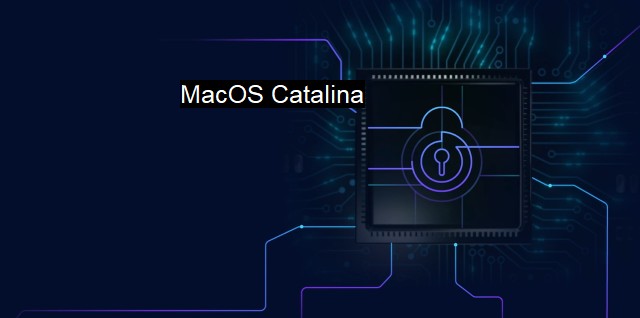What is MacOS Catalina?
Upgrading CyberSecurity with MacOS Catalina: Enhanced Antivirus Protection to Safeguard Devices
MacOS Catalina, also known as macOS 10.15, is an operating system developed by Apple Inc. It is named after Santa Catalina Island, located in California, resonating with Apple's tradition of naming its operating systems after iconic California landmarks. Announced on June 3, 2019, at Apple’s Worldwide Developers Conference (WWDC), it was officially released on October 7, 2019. It marked the end of iTunes, replacing it with separate new apps namely, Apple Music, Apple TV, and Apple Podcasts.Multifaceted apps featuring across multiple products, from desktops to iPads, singular data transfer operations and brightened user security norms, in its entirety make up the concept of macOS Catalina. With Catalina, Apple mainly focused on enhancing the OS's security for users’ data protection, an area that is rapidly shrinking from the prying eyes of cyber threat actors. Thus, in broad view, macOS Catalina represents an important leap forward in cybersecurity and antivirus.
Under the hood of the macOS Catalina's security enhancements, system-wise adjustments are prominent. Apple moved past the traditional approach of operating systems and bifurcated the Catalina’s system files and user file sections into two parts, thus limiting access and preventing any desirable changes to the system files by the users. This significant restructuring was achieved through a read-only system volume into which the OS gets secured.
Such design significantly prevents any accidental or malicious action from wreaking havoc on system files. This essentially renders major variants of macOS malware helpless, thereby enhancing protections against ransomware and data-destroying bugs. The implementation of this feature presents difficulties for the viruses or malicious software to inject or alter the system file, leading to an amplified user-data security.
MacOS Catalina also introduces heightened app-level gatekeeping. Before Catalina, apps downloaded outside the confines of the App Store had to go through Gatekeeper, Apple's proprietary security protocol that validates apps for malicious codes. Catalina extended this: regardless of where apps are purchased or downloaded, developers must submit them for scanning by Apple for malware and other security issues, and incorporate a unique cryptographic signature from the developer.
This ‘Notarization’ feature also ensures that the apps undergo cybersecurity checks for malware and other common threats every time an update rolls out. Apps not complying with the security checks block the execution of the software, protecting users from inadvertently installing malware or other malicious software.
‘Activation Lock’ shares the spotlight as another novelty from macOS Catalina, building on existing technologies already provided for iOS and watchOS devices. It basically turns your Mac into a paperweight for anyone unauthorized. In unfortunate events of system theft or misplacement, even if someone manages to erase your data and reinstall the OS, the Mac won’t proceed further without the Apple ID and iCloud Password.
Enhanced data-protection transparency is seen in Catalina. Apps need explicit user’s approval before accessing data in the desktop, Documents, and Downloads folder or iCloud Drive. This further extends to safeguarding sensitive parts of the system such as recent messages, mail database, safari history, Time Machine backups, etc.
To sum it up, Apple’s macOS Catalina brought forward a new era in cybersecurity and antivirus protection, providing efficiency, intuitiveness, and ease-of-use contributing towards a seamless and secure digital experience for users. With multilayered security provisions that encase system file protection, app gatekeeping, data protection transparency and device locking technologies, macOS Catalina’s importance and continuing influence in terms of cybersecurity cannot be overstressed.

MacOS Catalina FAQs
Is macOS Catalina secure against cyber attacks?
Yes, macOS Catalina includes various security features such as Gatekeeper, System Integrity Protection, and enhanced privacy controls that help protect against cyber attacks.Does macOS Catalina come with built-in antivirus software?
Yes, macOS Catalina comes with a built-in antivirus software called XProtect, which provides basic protection against known malware threats.Can I install third-party antivirus software on macOS Catalina?
Yes, you can install third-party antivirus software on macOS Catalina. However, make sure that the software is compatible with Catalina before installing it.Does upgrading to macOS Catalina make my computer more secure?
Upgrading to macOS Catalina may improve the security of your computer as it includes several security enhancements. However, it's important to note that no operating system can guarantee complete protection against all types of cyber threats. It's still important to practice safe browsing habits and use antivirus software to stay protected.| | A | | | B | | | C | | | D | | | E | | | F | | | G | | | H | | | I | | | J | | | K | | | L | | | M | |
| | N | | | O | | | P | | | Q | | | R | | | S | | | T | | | U | | | V | | | W | | | X | | | Y | | | Z | |
| | 1 | | | 2 | | | 3 | | | 4 | | | 7 | | | 8 | | |||||||